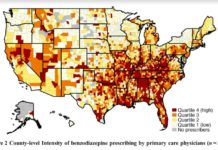Is Long-term Use of Benzodiazepines a Risk for Cancer?
A large study of the population in Taiwan reveals that long-term use of benzodiazepine drugs, commonly prescribed for anxiety, significantly increases the risk for brain, colorectal, and lung cancers. The research, published open-access in the journal Medicine, also identifies the types of benzodiazepines that carry the greatest cancer risk.
Members of FDA Advisory Committee Offer Perspectives on Flibanserin Approval in JAMA
In the September issue of The Journal of the American Medical Association (JAMA) three FDA advisory committee members describe the convergence of factors that made the committee’s recommendation to approve flibanserin especially challenging and politically charged.
Psychotropic Medications Serve as Powerful Tools for U.S. Military, Imperialism
Ethnographic research sheds light on extensive psychopharmaceutical use by soldiers in post 9/11 U.S. wars.
Study Links SSRIs to Violent Crime in Youth
Individuals between the ages of 15 and 24 are more likely to commit a violent crime if they are taking an SSRI antidepressant than if they are not, according to new research out of Sweden. The study published in PLoS Medicine on Tuesday, suggests "warnings about the increased risk of violent behavior among young people taking SSRIs might be needed.”
After the Black-Box: Majority of Children Starting SSRIs Still Receiving Too High of Dose
In 2004, the FDA added a black-box warning to SSRI antidepressants on the increased risk of suicide among children taking these drugs. A new study suggests that this warning has increased the proportion of children who begin an antidepressant on a low dose, but the majority are still receiving higher than recommended doses.
Researchers Warn of “Brain Atrophy” in Children Prescribed Antipsychotics
Researchers discuss the evidence that antipsychotic medications may cause brain atrophy in children, whose brains are still developing.
ADHD Drugs Linked to Psychotic Symptoms in Children
Stimulant medications like Ritalin and Adderall, often prescribed to treat children diagnosed with ADHD, are known to cause hallucinations and psychotic symptoms. Until recently these adverse effects were considered to be rare. A new study to be published in the January issue of Pediatrics challenges this belief, however, and finds that many more children may be experiencing psychotic symptoms as a result of these drugs than previously acknowledged.
Unsafe Use of Sleep Drug Zolpidem is Common
Three out of four users of the sedative, zolpidem (brand name Ambien), do not follow FDA recommendations to reduce risk.
Antipsychotics Associated with High Risk of Death in Children
A new study has found that children and adolescents taking a high dose of antipsychotics are almost twice as likely to die of any cause than children on other types of medications.
Prescription Stimulant Use is Associated with Earlier Onset of Psychosis
Individuals diagnosed with psychotic disorders have an earlier onset of psychosis if they have previously been exposed to prescription stimulants, according to new research currently in press in the Journal of Psychiatric Research.
Researchers Call for Reappraisal of Adverse Mental Effects of Antipsychotics, NIDS
In a study published yesterday, researchers from the Nippon Medical School in Tokyo bring attention to a condition known as neuroleptic-induced deficit syndrome (NIDS)...
Violence Caused by Antidepressants: An Update after Munich
The media is now reporting details about the 18-year-old who shot and killed nine and wounded many others before killing himself on July 22 in Munich. My clinical and forensic experience leads to a distinction among people who murder under the influence of psychiatric drugs. Those who kill only one or two people, or close family members, often have little or no history of mental disturbance and violent tendencies. The drug itself seems like the sole cause of the violent outburst. On the other hand, most of those who commit mass violence while taking psychiatric drugs often have a long history of mental disturbance and sometimes violence. For these people, the mental health system seems to have provoked increasing violence without recognizing the danger.
Evolution or Revolution? Why Western Psychiatry Won’t Change by Incremental Steps
...but how realistic is it to expect that the biological skew of Western psychiatry can be sustainably changed one small step at a time?
Researchers Address Dangers of Polypharmacy and Inappropriate Medication Use
A new special issue brings together articles exploring the harmful effects of simultaneous multiple medication use.
Systematic Review Finds Antidepressant Withdrawal Common and Potentially Long-lasting
Prominent researchers conduct a review of antidepressant withdrawal incidence, duration, and severity. Results lead to call for new clinical guidelines.
Benzodiazepine Prescriptions Increase with Overdose Deaths
A recent article in the American Journal of Public Health calls for policy level interventions to reduce the use of benzodiazepines, drugs commonly prescribed...
Poor Evidence and Substantial Bias in Ritalin Studies
The authors of a large scale well-conducted systematic review of methylphenidate, also known as Ritalin, conclude that there is a lack of quality evidence for the drug’s effectiveness. Their research also revealed that Ritalin can cause sleep problems and decreased appetite in children.
5 Steps to Personalize Deprescribing Practices
Researchers identify simple ways for clinicians to begin deprescribing conversations.
New Data Show Lack of Efficacy for Antidepressants
An article published this month in the journal BMC Psychiatry suggests that there is a lack of efficacy for SSRIs and that they significantly increase the risk of serious side effects.
Drug Treatment for Borderline Personality Disorder Not Supported By Evidence
New research published in the August issue of Psychiatric Annals evaluates the results of randomized control trials on the use of various psychotropic drugs for patients diagnosed with borderline personality disorder (BPD). Despite the “American Psychiatric Association’s practice guidelines endorsement of SSRIs as first-line therapies for BPD,” the results of the meta-analysis reveal that pharmacotherapy in BPD is “not supported by the current literature,” and “should be avoided whenever possible.”
Benzodiazepine Prescriptions in Older Adults Used in Rural and Low Income Areas
Benzodiazepine prescription practices may be in response to an epidemic of distress, rather than being used to treat specific mental health diagnoses.
Researchers Develop New Model for Understanding Depression
Acknowledging that current depression treatments are failing many people, researchers from Michigan State and MIT have developed a new model for understanding how multiple psychological, biological, social and environmental factors contribute to depression.
The ADHD Drug Abuse Crisis on College Campuses
The abuse of ADHD drugs on college campuses has reached epidemic proportions, according to the authors of a recent review in the journal of Ethical Human Psychology and Psychiatry. ADHD drugs, like Ritalin and Adderall, have become so commonplace on college campuses that students abusing these drugs for studying, weight loss and partying have underestimated their risks. As a result, we have seen exponential increases in emergency room visits, overdoses, and suicides by students taking these drugs.
Safety Analysis Weighs Harms and Benefits of Antipsychotic Drugs
The researchers find that the drug effects for reducing psychosis are small and that treatment failure and severe side effects are common.
Poor and Foster Care Children More Likely to be Diagnosed and Treated with Psychiatric...
Study details Medicaid-insured birth cohort’s exposure to psychiatric medications and mental health services.





















